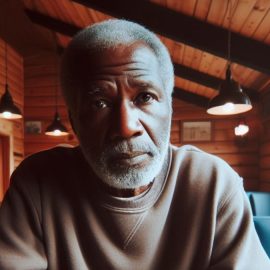

This article is an excerpt from the Shortform book guide to "Models" by Mark Manson . Shortform has the world's best summaries and analyses of books you should be reading.
Like this article? Sign up for a free trial here.
Do you avoid asking women out because you’re scared of being rejected? How do you overcome the fear of rejection in dating?
You’ll inevitably encounter some women who are clearly disinterested, but that shouldn’t put you off from dating. Fear of rejection is a big impediment to your success with women because it prevents you from trying, and you can’t succeed if you don’t try.
With this in mind, here’s how to overcome the fear of rejection in dating.
Overcoming Fear of Rejection
When you don’t pursue a woman because you’re worried she’ll reject you, you embody non-confidence: You’re prioritizing her potential judgment of you instead of acting on your own truth (your desire to approach her). In contrast, by actively pursuing a woman, you embody confidence: You’re acting on your own truth—even if you’re afraid that she’ll reject you.
(Shortform note: In The Subtle Art of Not Giving A F*ck, Manson adds that overcoming your fear of rejection in dating is helpful not just when pursuing a woman but also once you’ve entered into a committed relationship with one. Manson asserts that in a healthy relationship, both partners prioritize being honest with each other; in other words, they both act on their own truths and embody confidence, and they’re comfortable with both saying and hearing “no.” While this rejection can result in hurt feelings, this pain is short-lived because both partners care about each other enough to work through the difficulty together.)
Manson warns that if you don’t overcome these worries, you’ll likely handle them in a potentially problematic way. Notably, you might hold women responsible for your fear, which can create damaging prejudices. For example, if you’re afraid to speak to women, you might fool yourself into thinking that the reason you don’t talk to women is that all women are too stupid to talk to you. Alternatively, you might tell yourself that you don’t know how to talk to women yet and need to learn more flirting tips—which prevents you from practicing and improving your real-life skills. For example, you’ll read yet another dating book instead of going on Tinder.
| Incel Psychology: The Risk of Not Overcoming Your Worries If your fear prevents you from actively pursuing women and you’re trying to learn more about how to approach them online, you might come across the incel community. “Incels,” or involuntary celibates, believe that they weren’t born physically attractive and are thus unable to have sexual relationships with women. These men assume that women only sleep with physically attractive men, that other qualities like kindness don’t attract women, and moreover, that their own levels of physical attractiveness are fixed and not improvable. As a result, they blame women for their lack of sexual prowess and don’t try to date them because they think they’ll be rejected anyway. Incels sometimes go to extremes: Many self-identified incels have committed mass murder. |
That said, overcoming these worries doesn’t necessitate that you get rid of them entirely. As Manson points out, worry is a normal emotion that you’ll never eradicate. Rather, to build confidence, you must learn to act despite any worry you might feel. Each time you do so, you’ll become a little bit braver.
For example, if you ask a woman you’ve never met out on Instagram, you should write, “I know this is a little weird, but do you want to meet in person sometime?”’
| Why Acting Despite Your Worry Might Make You Braver In Emotional Intelligence, Daniel Goleman elaborates on why acting despite your worry might make you braver. Goleman explains that worry exists because it’s beneficial: Worrying helps you come up with solutions by anticipating danger before it occurs. This is why it’s tough to simply stop worrying—your rational brain sees why worrying is good and so wants you to continue doing so. Therefore, Goleman states that you must actively challenge your worries by asking yourself questions like, “Is this dreaded event probable?”. It’s possible that acting despite your worry also constitutes a challenge to those worries: You prove to your brain that your worry wasn’t useful—and so you’re less likely to worry when you take a similar action in the future. |
How to Act Despite Your Worry
So how do you get yourself to act despite your worry? Manson suggests that the first step to overcoming these worries is to identify exactly what scares you. The most damaging fear is the fear of approaching a woman because unless you can speak to a woman, you’ll never forge an intimate connection with her. However, you may be scared of other things, like asking her out once you’ve gotten her number.
(Shortform note: The Factfulness authors argue that fear depends on both your risk and exposure, and so you can reduce your fear by evaluating the likelihood of your feared outcome actually happening. So after identifying exactly what scares you, consider also identifying your worst-case scenario and how likely that scenario is to happen. For example, your worst-case scenario when approaching a woman or asking her out might be that she tells you that you’re gross and that she was never interested in you—but most people are polite enough not to do that. By acknowledging that your worst-case scenario is unlikely to happen, you’ll lessen your fear.)
Second, select the tiniest possible version of the thing that scares you. Repeat this tiny thing daily until it’s not hard, then make it slightly harder—until you eventually work up to doing the major thing that scares you. For example, say you’re scared of having conversations with women. Instead of trying to force yourself to talk, make a goal to simply smile at three women each day. Once you grow comfortable with that, add just one sentence, like “Have a nice day!” when speaking with, say, a female barista. Slowly work up to adding more sentences until you’re comfortable with a full-blown conversation.
(Shortform note: Manson’s description of how to overcome your worries is similar to how BJ Fogg recommends that you develop a habit in Tiny Habits. Like Manson, Fogg suggests that you identify an impactful behavior and make it completely unintimidating by selecting its tiniest possible version. Fogg recommends that you repeat this behavior daily until it’s not hard, and then expand it slightly. Unlike Manson, Fogg suggests that you celebrate each time you successfully perform the tiny behavior—a habit you may want to adopt each time you successfully do the tiny thing that scares you. When you celebrate your success, you feel good—and your brain notes and reinforces any actions it performed before feeling good.)

———End of Preview———
Like what you just read? Read the rest of the world's best book summary and analysis of Mark Manson 's "Models" at Shortform.
Here's what you'll find in our full Models summary:
- How a heterosexual man can attract a woman in the modern world
- The three keys to developing inner confidence
- Why you should stop fearing rejection






